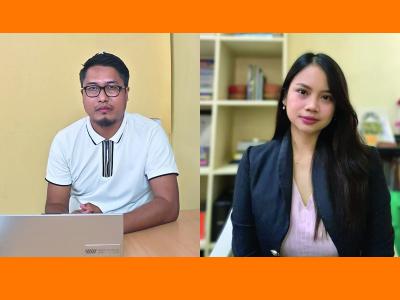
Two international scholars have been appointed to year-long fellowships at the University of Edinburgh to explore how Indigenous communities from the Philippines and India can inform global debates around the arts, the environment and peacebuilding.
Dr Elsie Albis and Dr Dustin Lalkulhpuia will arrive in Scotland in January 2026 to take up prestigious fellowships in collaboration with the British Council and the Institute for Advanced Studies in the Humanities (IASH) at the University of Edinburgh. The British Council recently celebrated its 90th anniversary. To mark the occasion, two Fellowships each year are offered to emerging researchers from countries receiving Official Development Assistance, reflecting diverse economic, cultural, and geographical contexts.
The Fellowships support research that is aligned with the overarching vision of the British Council - “a more peaceful and prosperous world built on trust” – with the aim of developing connections, understanding and trust between people in the UK and countries worldwide. Christine Wilson, Director Research and Insight at the British Council, said, “We're delighted to be supporting these timely and ambitious research fellowships, as part of our commitment to helping global researchers build lasting connections with the UK, to promoting inclusive knowledge exchange around shared challenges, and in highlighting the role that culture and education have to play in building climate resilience around the world. We welcome the new knowledge and outlook these exceptional early career researchers bring, and look forward to working with them.”
Professor Lesley McAra, Director of IASH, was also closely involved in the appointment of the Fellows and will support their projects while in Edinburgh: “We are thrilled to welcome Dr Albis and Dr Lalkulhpuia to Scotland. As part of our interdisciplinary research community, they will contribute to vital debates around climate change and justice, and how we can bring different forms of knowledge together to form a truly sustainable future.”
Dr Elsie C. Albis (she/her) is a teacher and theatre practitioner. She teaches literature and theatre at Ateneo de Naga University (ADNU) in the Philippines, where she served as the chair of the Creative Endeavors Council (CEC) and founded the university's theater organization, Dulaang Agabaab.
Dr Albis said, “My project supports IASH’s agenda of empowering local knowledge and the British Council’s goals through crossing or dakit, one of the root words for the Bikol term for translation (dakitaramon) and pakikipagkatuod (collaboration) with Edinburgh scholars in enduring, remembering, and responding to the tempests we universally face. Theatre is a powerful tool for collaboration and peacebuilding. Through translation, we can bring Shakespeare to Bikol and connect the UK to the Philippines. Together, we can produce a story—of storm, survival, and the will to hope.”
She holds a PhD in Literature from the University of Santo Tomas, Manila, and was a fellow of the UST, DLSU Kritika, and Ricky Lee writing workshops. Her scholarly work has been published in various outlets, including the journal Filipinas and the CCP Encyclopedia of Philippine Art. She has also presented her research internationally, including at the University of Oxford. As a theatre practitioner, her plays have been featured in Pista Nin Teatrong Bikolnon in Albay, Philippines. She organized the Hablon Theater Festival and the Aligas Writers Workshop in Naga City, Philippines.
Dr Dustin Lalkulhpuia (he/him) is a Mizo academic and writer from Northeast India with a PhD in English and Culture Studies. His research engages with Indigenous knowledge, ethics, and postcolonial literatures drawing on over a decade of embedded experience among more than twenty Indigenous communities across the Northeast Indian region, including the Mizo, Khasi, Naga and Tripuri. He has collected and documented Indigenous folk narratives, oral histories, and songs that inform both his scholarship and creative work. He is the author of the monographs Identity in Northeast Indian Literature: Rereading Select Writings from Meghalaya (2024) and Kokborok Literature from Tripura: Voices from Below (2023), and has more than nine years of experience in media and journalism.
During his British Council Fellowship at the Institute for Advanced Studies in the Humanities, he will explore how Indigenous concepts such as tlawmngaihna, jhum, and Kuknalim can reshape global conversations on care, sovereignty, and sustainability. Dr Lalkulhpuia commented, “This year, I hope to deepen conversations between Indigenous worlds that have rarely met on equal ground. The lifeways and philosophies of Northeast India hold profound lessons about care, ethics, resilience, and belonging in an age of ecological crisis. Through this work, I want to bring those voices into dialogue with global ideas about how we live, imagine, and sustain the world together.”
For more information on the Fellowship programme, please visit https://www.iash.ed.ac.uk/british-council-90th-anniversary-research-fellowships
